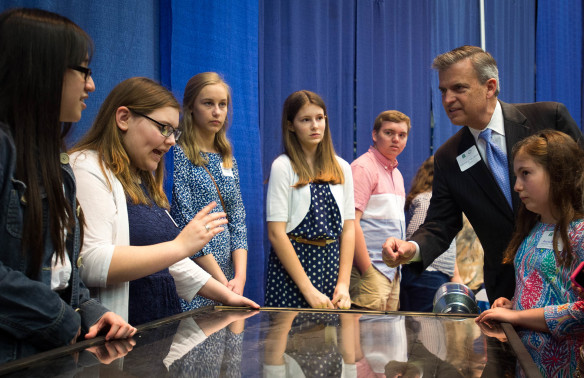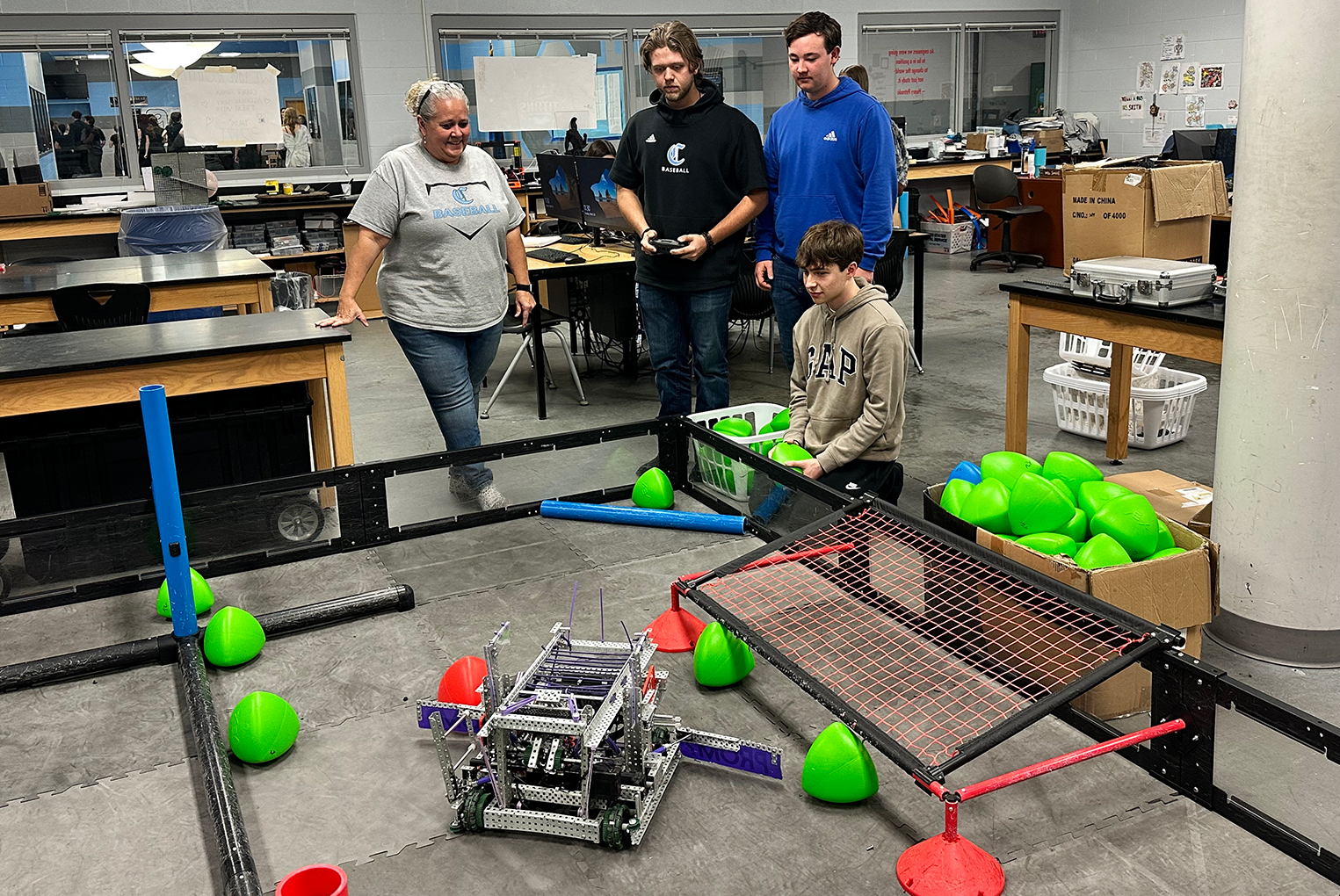
New Kentucky Board of Education Chair Hal Heiner talked with students from West Hardin Middle School (Hardin County) about their solar heater at the ninth annual Youth Summit and Awards Luncheon in Frankfort. Heiner, who spent the past two years as secretary of the Education and Workforce Development Cabinet, says he hopes to bring a sense of urgency and an understanding of the rapidly changing economy to the board.
Photo by Bobby Ellis, April 28, 2016
By Jennifer Ginn
Jennifer.ginn@education.ky.gov
Louisville public high school graduate Hal Heiner, who most recently served as secretary of the Kentucky Education and Workforce Development Cabinet (KEWDC), became a Kentucky Board of Education member in April and was named chair at the board’s regularly scheduled meeting in August.
During his past 2-1/2 years at KEWDC, the cabinet has worked to advance several education initiatives in conjunction with its attached agency, the Department of Education. Two successful initiatives of the cabinet include providing student funding for high school dual credit courses for the first time in Kentucky history and developing the Work Ready Skills Initiative that is resulting in a $250 million-dollar investment in career and technical education across the state.
He also has been a member of the Asbury University Board of Trustees, the University of Louisville Board of Overseers, the Christian Academy of Louisville Board of Directors, the Summit Academy Board of Trustees, and the Metro Leadership Foundation — an organization focused on after-school instruction for children. Heiner holds a master’s degree in engineering from the University of Louisville and is the founder of Capstone Realty, a successful development firm responsible for helping bring and keep more than 5,000 jobs in the Greater Louisville region.
Kentucky Teacher staff had a chance recently to ask Heiner about his priorities while serving on the Kentucky Board of Education. Here’s what he had to say.
Why were you interested in serving on the Kentucky Board of Education?
“After serving for the past two years as secretary of the Education and Workforce Development Cabinet, I have seen firsthand the accomplishments of the Kentucky Department of Education and the enormous potential for the department to aid in the next generation’s preparation for life. I firmly believe that the noblest pursuit in life is to pour our time and energy into young people for their future benefit and I personally wanted to serve in a capacity closer to the children.”
What impact do you hope to have on the board?
“I hope to bring both a sense of urgency and an understanding of the rapidly changing economy to the board. As the world automates, skills and education become increasingly valuable and low-skill jobs evaporate. According to a 2018 WalletHub report, our Commonwealth ranks in the bottom 10 percent of the country in the number of residents with college credentials, and the future of our young people and Kentucky demands an immediate response.”
Other than more money, what do Kentucky schools need most?
“Kentucky needs to adopt, at a minimum, a focused intervention plan that ensures each student entering 4th grade can read, and that each high school graduate can read and has a working knowledge of mathematics.
“Although average student achievement has flatlined for a decade, data disaggregation shows a worsening achievement divide often correlating with socioeconomic factors. Our responsibility is to define equity as ‘every student gets what they need.’ This approach will require a greater freedom for parents to select a public school best meeting their child’s needs.”
What are the greatest strengths of Kentucky’s schools? And what are their biggest challenges?

Kentucky Board of Education Chair Hal Heiner was raised in Louisville and is a graduate of Atherton High School.
Photo submitted
“Beyond any doubt, dedicated teachers are the greatest strength of our schools. As administrators, our responsibility is to cut the red tape they face to allow greater time for student learning, freedom to innovate and alternative frameworks that make sure every child gets what they need.
“Some of the current challenges facing most schools include developing a sufficient number of high school teachers who are eligible college adjunct faculty, which will help rapidly expand dual credit offerings. Additionally, we must find a way to hire adequate numbers of dedicated career counselors, who can help students find those areas of interest that spark their enthusiasm for learning. A third challenge is the recruitment of computer teachers to dramatically increase the number of computer science/IT courses. Today, less than half of our high schools offer computer science, which will not sustain our future economy.”
Who was your favorite teacher and why?
“My 5th-grade teacher was Ms. June. I am forever grateful for the special interest she showed in me. Her interest and expectations helped me realize that results vary based upon individual diligence combined with working effectively together with others to achieve even greater gains.”
One of the Kentucky Department of Education’s priorities is to address the achievement gap. How do you think we can do that?
“I have seen schools totally eliminate the achievement gap through individualized education frameworks developed to meet the full needs of the child. Often these frameworks include real-time interventions for students falling behind, extended instruction time, adding student supports that address housing, nutrition and medical care; and intensive career exposure and counseling to broaden students’ context of life. After seeing these successful schools up close, I am convinced closing the achievement gap in those foundational elementary and middle school grades can be achieved within six years and is only dependent upon school administrators’ embrace of proven frameworks.”
What else would you like Kentucky’s educators to know about you?
“My wife Sheila and I have 11 grandchildren and, Lord willing, little Helen will become our 12th in September. I am deeply concerned about her future. The world is placing increasingly higher premiums on skills and education and much of Kentucky is far behind the national post-secondary success pace by every metric. My civic sense of urgency is driven by Kentuckians’ unlimited potential and the attainable opportunity to improve the lives of those following us.”



Leave A Comment